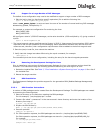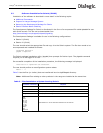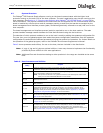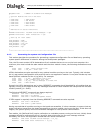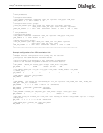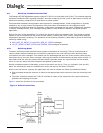
29
Dialogic
®
DSI SS7MD Programmer’s Manual Issue 3
4.4 System Configuration
System configuration is handled by the gctload program that reads system configuration data from a file
called system.txt. System initialization requires:
• First, that a pool of message buffers is created for subsequent inter-process communication.
• Second, that a message queue is created for each process that will run and that any message redirection
for modules that are running remotely is initialized.
• Finally, that all processes can be started.
The gctload program handles this initialization sequence and creates the inter-process communication
environment. The program reads input from the system.txt configuration file, carries out all system
initialization and starts all processes.
The system.txt configuration file is a user-configurable file containing details of the module identifiers known
to the system, details of whether they are local modules or remote modules accessed by a local module
(message redirection), and includes the command line for the processes to be started by the gctload
program.
The gctload program creates a message queue for each of the local module identifiers. The program
subsequently expects a process to service its message queue; otherwise messages written to that queue will
never be read causing eventual loss of system messages.
The gctload program initializes the message queue look-up table so that messages destined for modules that
do not exist locally are redirected to a message queue for a module that exists locally.
Having created the system environment, the gctload program proceeds to spawn the processes listed in the
system.txt configuration file in the order listed.
Note: Prior to running the gctload program, the system.txt configuration file must be edited to reflect the
requirements of your system.
4.4.1 System Configuration File Syntax
The system.txt configuration file is a text file used by the gctload program to configure the software
environment. The file syntax permits the use of comments to improve the readability of the file. See the
Software Environment Programmer's Manual for more information about this file.
An example system.txt configuration file is shown below:
********************************************************************************
*
* Example System Configuration File (system.txt) for use with
* the Linux Development Package for Dialogic(R) SS7 Boards
*
*
********************************************************************************
*
* Essential modules running on host:
*
**
LOCAL 0x20 * ssdm - Board interface task
LOCAL 0x00 * tim_lnx - Timer task
*
* Optional modules running on the host:
*
LOCAL 0xcf * s7_mgt - Management/config task
LOCAL 0x2d * upe - Example user part task
*
* Modules logically running on the board (all redirected via ssdm):
*
REDIRECT0x10 0x20 * LIU-Switch Management Module
REDIRECT0x8e 0x20 * Board Management Module
REDIRECT0x31 0x20 * ATM Module
REDIRECT0x41 0x20 * Q.SAAL Module
REDIRECT0x70 0x20 * Signalling Driver Module
REDIRECT0x71 0x20 * SP0 MTP2 Module
*



